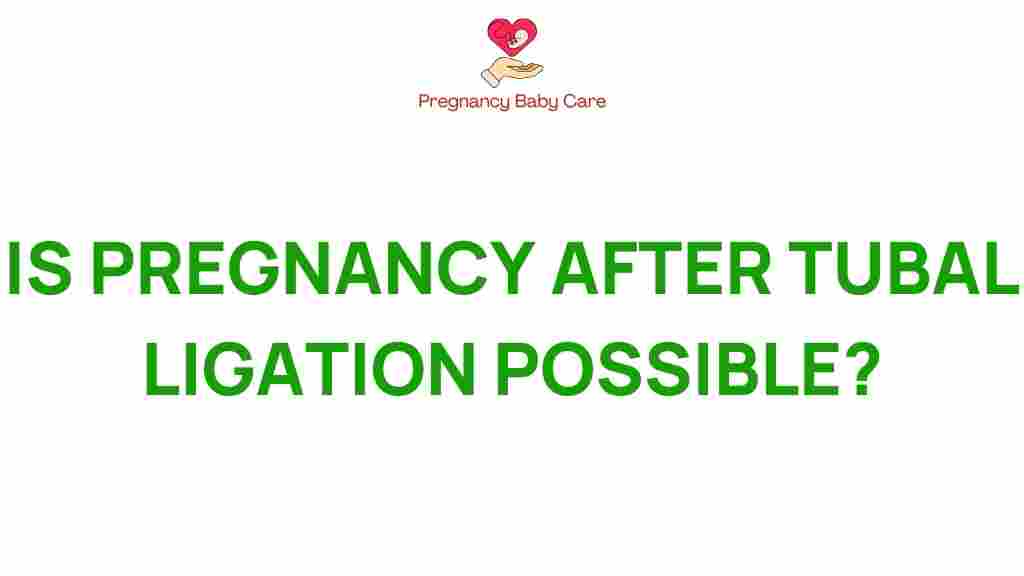Is Pregnancy After Tubal Ligation Possible?
For many women, tubal ligation serves as a reliable method of permanent birth control. However, as life circumstances change, the question often arises: is pregnancy after tubal ligation possible? Understanding the complexities of fertility and reproductive health is crucial for women considering their family planning options. In this article, we will unravel the myths surrounding pregnancy post-tubal ligation, exploring the medical facts, addressing misconceptions, and offering insights into options for those wishing to conceive.
Understanding Tubal Ligation
Tubal ligation, commonly referred to as “getting your tubes tied,” is a surgical procedure aimed at preventing pregnancy. During this procedure, a woman’s fallopian tubes are blocked, cut, or sealed to prevent sperm from reaching an egg. While tubal ligation is considered a permanent form of contraception, it is essential to understand the nuances of reproductive health and the possibility of conception post-procedure.
Can You Get Pregnant After Tubal Ligation?
While tubal ligation is designed to prevent pregnancy, it is not infallible. In rare cases, women may still conceive after undergoing the procedure. The likelihood of natural conception after tubal ligation is approximately 1-2%. Here are scenarios where pregnancy may occur:
- Recanalization: Sometimes, the fallopian tubes can spontaneously reconnect over time, allowing for the possibility of pregnancy.
- Ectopic Pregnancy: If conception occurs after a tubal ligation, there is a heightened risk of ectopic pregnancy, where the fertilized egg implants outside the uterus.
- Incomplete Procedure: In some instances, the tubal ligation may not have been completed successfully, leaving some portions of the fallopian tubes intact.
Common Misconceptions About Pregnancy After Tubal Ligation
There are several misconceptions surrounding pregnancy after tubal ligation that can lead to confusion and anxiety. Let’s address some of the most common myths:
- Myth 1: Tubal ligation is 100% effective.
- Myth 2: If you experience irregular periods post-surgery, you cannot conceive.
- Myth 3: Tubal ligation affects your overall fertility or reproductive health.
- Myth 4: Once you have a tubal ligation, you can never have a successful pregnancy.
Fertility Options After Tubal Ligation
If you are considering pregnancy after tubal ligation, there are several options available:
- Tubal Reversal Surgery: This procedure can reconnect the fallopian tubes, allowing for the possibility of natural conception. Success rates vary based on factors such as the type of tubal ligation performed and the woman’s age.
- In Vitro Fertilization (IVF): IVF circumvents the fallopian tubes entirely, allowing for embryos to be implanted directly in the uterus. This is a common option for women who have had a tubal ligation.
- Adoption: If pregnancy is not possible or desired, many choose to expand their families through adoption, which offers a loving home to children in need.
Step-by-Step Process for Exploring Pregnancy Options
If you are contemplating pregnancy after tubal ligation, follow these steps to explore your options:
- Consult a Healthcare Provider: Schedule an appointment with a reproductive health specialist to discuss your desire for pregnancy and review your medical history.
- Discuss Tubal Reversal: If you are interested in tubal reversal surgery, your doctor can evaluate your suitability for the procedure based on your health and the type of tubal ligation performed.
- Consider IVF: If reversal is not an option or you prefer a different method, discuss the possibility of IVF with your doctor.
- Explore Adoption: If you wish to expand your family through adoption, research local agencies and consider the requirements involved.
- Stay Informed: Keep up with the latest information on reproductive health and family planning to make educated decisions.
Potential Risks and Considerations
While exploring pregnancy options after tubal ligation, keep in mind the following considerations:
- Health Risks: Pregnancy after tubal ligation can carry risks, including ectopic pregnancy. Always discuss these risks with your healthcare provider.
- Age and Fertility: A woman’s age can significantly impact fertility, so it’s essential to consider this factor when planning for pregnancy.
- Emotional Impact: The journey to conception after tubal ligation can involve emotional challenges. Seek support from friends, family, or counselors as needed.
Medical Advice and Support
It’s crucial to seek medical advice from qualified healthcare professionals when considering pregnancy after tubal ligation. They can provide personalized assessments and recommend the best course of action based on your individual health and circumstances. Online resources, such as the American Society for Reproductive Medicine, can also offer valuable information about reproductive health.
Conclusion
In conclusion, while pregnancy after tubal ligation is not the norm, it is indeed possible under certain circumstances. Understanding the factors that influence fertility, dispelling common misconceptions, and exploring available options can empower women in their family planning journey. Whether considering tubal reversal, IVF, or adoption, women have various paths to explore. Always consult with healthcare providers to ensure informed decisions regarding your reproductive health and family planning.
Remember, every woman’s journey is unique, and staying informed is key to making the best choices for your reproductive health and family goals.
This article is in the category Pregnancy and created by PregnancyBabyCare Team
